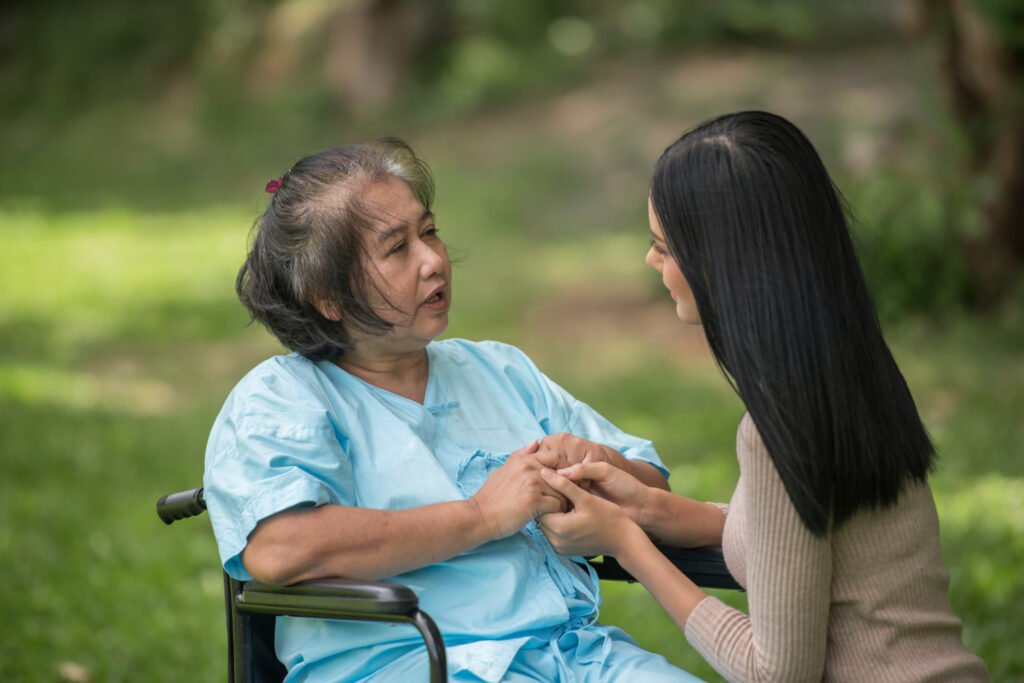Why Compassion Matters in Caregiving

Compassion means “to suffer together.” It happens when you see someone in pain and want to help. Emotion experts say compassion is the feeling that prompts you to ease another person’s suffering. It’s not the same as empathy or kindness, but they are connected.
Caregiving is a labor of love that requires compassion. But even love can run dry when the needs are constant and rest is rare. That’s when something called “compassion fatigue” can sneak in.
What is compassion fatigue?
Compassion fatigue in nursing happens when constant exposure to patient suffering leads to emotional and physical burnout. Nurses begin to carry their patients’ pain and trauma, which can dull their empathy, cause them to feel disconnected and harm their overall well-being.
Have you ever experienced this as a caregiver? If not, you likely will at some point. When this occurs, you jeopardize your capacity to offer the best care to your loved one.
The effort you put into your caregiving may have brought you joy early on. Are there ways to restore that joy and counter the impact of compassion fatigue? Absolutely.
You can manage compassion fatigue through lifestyle changes and other strategies. Here’s how.
1. Know the signs of compassion fatigue.

Many caregivers miss the early signs of compassion fatigue. It can feel like “just being tired,” but it’s more than that. What are some symptoms you should be aware of?
- Brain fog
- Trouble sleeping or focusing
- Muscle and joint pain
- Snapping at others
- A heavy feeling of guilt or sadness
- Thinking “I can’t do this anymore”
If this sounds like you, take heart. Naming the problem is the first step to healing.
2. Take care of your inner person.

Caregivers give so much of their energy and heart to others. But the person you are inside matters too.
Try these small ways to restore your spirit or inner person:
- Pause and breathe. Taking five deep breaths or accepting a hug can help calm your nervous system.
- Pray or reflect. A quiet moment with your faith or your thoughts can bring peace of mind.
- Journal. Write one sentence a day about how you feel. No judgment, just honesty.
Your spirit needs care just like your body does. And even a small daily routine can remind you that you matter too.
3. Ask for help without feeling guilt.
One of the hardest caregiver tips to follow is this: You don’t have to try to do it all.
Try these ways to share the load:
- Make a list. Write down small tasks others could do, like grocery runs or providing rides to appointments.
- Talk to family. Be honest about how tired you feel and what you need.
- Use local services. Look into respite care, adult day programs or meal deliveries.
Community is part of the caregiving journey.
4. Feed your body and mind and nurture joy.

You deserve moments that help energize you. You can start with these:
- Body: Drink water. Take a 10-minute walk. Stretch your shoulders.
- Mind: Listen to a calming podcast. Read a poem. Turn off the news for a while.
- Joy: Watch a funny video. Call a friend. Do something that makes you smile.
When you reenergize yourself, you’re able to care for others again.
Caregiver support is closer than you think.
Dealing with compassion fatigue just means you’re human. You’ve been carrying a heavy load with a faithful heart. But even the strongest caregivers need rest.
We see you and we’re here to help you feel less alone.
Let us know in the comments how you manage caregiver stress.
Compassion Fatigue FAQ
How is compassion fatigue different from burnout?
Burnout is often job-related. Compassion fatigue comes from deep emotional caregiving over time. Both can feel similar, but compassion fatigue often includes sadness and guilt.
Can compassion fatigue affect my health?
Yes. It can lead to sleep problems, headaches, anxiety or even depression if left unchecked. Taking care of yourself is key.
Is it okay to take a break from caregiving?
Yes. Breaks are healthy and necessary. Even short moments of rest can help recharge you.
How can I talk to my family about my stress?
Start simple. Say, “I’m feeling overwhelmed. I need some help.” Use “I” statements to share how you feel without blaming.
Are there support groups for caregivers?
Yes. Many local and online groups offer encouragement and advice. You’re never alone in this.







